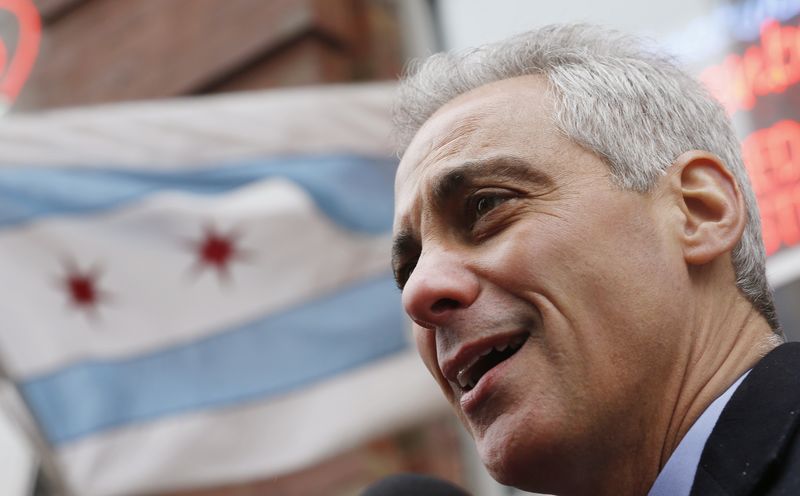CHICAGO (Reuters) - Chicago Mayor Rahm Emanuel on Friday called for phasing in higher, state-mandated payments to city pension funds to avoid a shock to the city's budget and a big property tax hike.
The move, which would require state legislation, was part of a plan released by Emanuel's re-election campaign ahead of an April 7 runoff election against Cook County Commissioner Jesus "Chuy" Garcia, who also released his fiscal plan on Friday.
Under an Illinois law, Chicago's contributions to its police and fire pension funds will increase by about $550 million next year. Another state law allowing cost-saving pension cuts to shore up Chicago's municipal and laborers' retirement funds is at risk of being voided as unconstitutional in state court.
Still, the mayor's plan advocated measures that labor unions and others are challenging in court. These include slowing cost-of-living increases for pensions and gradually increasing workers' contributions to ease costs.
Emanuel also called for closing Illinois tax loopholes to gain money for the third-biggest U.S. city, along with obtaining state approval for a publicly owned casino.
Garcia's plan seeks cost savings through intergovernmental collaboration and creates a committee to examine revenue options. It does not address possible funding sources for Garcia's campaign pledges to hire 1,000 new police officers and to replace traffic ticket revenue generated by red-light cameras he wants removed.
"It is too early to tell residents in the city of Chicago that we're going to give them bad medicine without stepping back and taking a comprehensive look and approach to how city finances will be met," Garcia told reporters.
He also said he opposes reducing pension benefits for current and retired city workers.
Emanuel received about 45 percent of the vote last month, short of the 50 percent level needed to avoid a runoff. He leads Garcia by 51-37 percent according to a Chicago Tribune voter poll released on Friday.
Mounting pension pressures led Moody's Investors Service to lower Chicago's credit rating by five notches since July 2013, with the last downgrade to Baa2 occurring on Feb. 27.

Garcia said Chicago could save as much as $350 million by consolidating purchasing and some services with other governmental bodies under the mayor's control, including the Chicago Public Schools. He also said Chicago's budget could receive a $150 million boost from reforming tax increment financing districts meant to spur economic development within certain geographic boundaries.